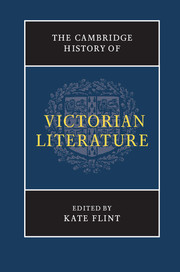Book contents
- Frontmatter
- Introduction
- PART I AUTHORS, READERS, AND PUBLISHERS
- PART II WRITING VICTORIA’s ENGLAND
- PART III MODES OF WRITING
- PART IV MATTERS OF DEBATE
- PART V SPACES OF WRITING
- 27 Spaces of the nineteenth-century novel
- 28 National and regional literatures
- 29 Britain and Europe
- 30 Victorian empire
- 31 Writing about America
- PART VI VICTORIAN AFTERLIVES
- Select bibliography
- Index
30 - Victorian empire
from PART V - SPACES OF WRITING
Published online by Cambridge University Press: 28 March 2012
- Frontmatter
- Introduction
- PART I AUTHORS, READERS, AND PUBLISHERS
- PART II WRITING VICTORIA’s ENGLAND
- PART III MODES OF WRITING
- PART IV MATTERS OF DEBATE
- PART V SPACES OF WRITING
- 27 Spaces of the nineteenth-century novel
- 28 National and regional literatures
- 29 Britain and Europe
- 30 Victorian empire
- 31 Writing about America
- PART VI VICTORIAN AFTERLIVES
- Select bibliography
- Index
Summary
In Catherine Spence’s novel, Gathered In (1881–2) a group of Australians stop to pay their respects at Elizabeth Barrett Browning’s grave in Florence. Marvelling at how the poet’s reputation attracted people from the ‘Australian wilds’ to ‘the busy centre of old civilization’, the hero Kenneth suggests that ‘genius is the strongest link to bind the world together’. Edith, the heroine, replies that Australians should be grateful to Britain, more than anything else, for producing English literature – a benign force that binds all English-speaking people together. Kenneth goes on: ‘We are nearer to England for all practical purposes … in Melbourne than the American colonies ever were, and I feel sure that its literature takes a very strong hold on the colonial mind.’ This idea of a globalized English literature is found, amongst other places, in the preface of a West Indian novel, Creoleana (1842). After claiming that he was not able to judge the general merit of West Indian literature, the author, J. Orderson, says that Barbadian authors had nonetheless contributed lavishly to its making, and moreover, ‘there are some of her children, who should not be considered as mere drones in the republic of letters; but rather as having contributed to enlarge the hive and dilate the comb’. Australia, Barbados, Florence – the physical distance between these places is apparently annulled by the power of English literature.
- Type
- Chapter
- Information
- The Cambridge History of Victorian Literature , pp. 641 - 661Publisher: Cambridge University PressPrint publication year: 2012

